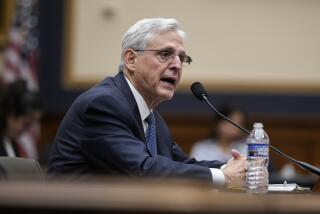Tucker’s Active Role Slows Bribery Trial : Courts: Congressman directs defense, frequently handing notes to lawyer and calling him for asides. Judge expresses displeasure.
- Share via
The extortion trial of U.S. Rep. Walter R. Tucker III (D-Compton) slowed to a crawl Wednesday as the congressman took a hands-on role in directing his defense.
Tucker seemed bent on directing cross-examinations with a daylong flurry of written messages to his lawyer.
At one point, U.S. District Judge Consuelo Marshall, who is hearing the case, turned to Tucker and said in an exasperated tone, “Mr. Tucker, I have to remind you. You do have counsel.”
Tucker is charged with soliciting and receiving $37,500 in bribes and demanding an additional $250,000 in kickbacks from two companies that were doing business with the city of Compton while he was mayor.
He also is charged with failing to pay income taxes on the money he is accused of illegally accepting.
Wednesday was expected to be a big day for the prosecution, which planned to call its first major witness, San Gabriel Valley businessman John Macardican.
Federal prosecutors say Macardican cooperated in an FBI investigation of corruption within Compton’s city government and is responsible for most of the videotapes and audiotapes that make up the bulk of the case against Tucker.
But Macardican was never called because of the lengthy questioning of Compton City Manager Howard Caldwell.
Prosecutors, who do not consider Caldwell a major witness, finished questioning him in an hour. Then one of Tucker’s lawyers, Robert Ramsey Jr., began a lengthy cross-examination.
Tucker kept writing Ramsey note after note. At one point, there were about two dozen of them stuck to the courtroom lectern. When Tucker wasn’t writing to Ramsey, he was calling him over.
“Bob, Bob,” Tucker said at one point in a stage whisper.
Ramsey on a number of occasions asked for a moment to consult with his client.
Judge Marshall kept asking how much longer the cross-examination was going to take.
In questioning Caldwell and Compton City Clerk Charles Davis, Assistant U.S. Atty. Steven Madison sought to establish that in 1991 Tucker had been in a position to influence major decisions and that the City Council can overrule city staff recommendations to benefit those willing to buy votes.
By contrast, Ramsey’s questioning concentrated on trying to show that Compton has a strong city manager system, with the mayor having little actual power.
The defense also tried to establish that Tucker was paid for lobbying the Compton school district, which Tucker’s lawyers say is not a conflict of interest.
Other payments, the defense says, were campaign contributions.
Caldwell and Davis will return today for further cross-examination. Macardican is expected to be next.
More to Read
Sign up for Essential California
The most important California stories and recommendations in your inbox every morning.
You may occasionally receive promotional content from the Los Angeles Times.













